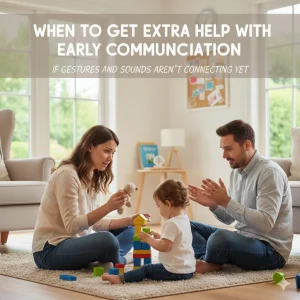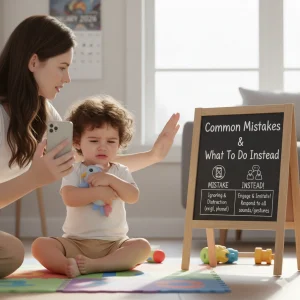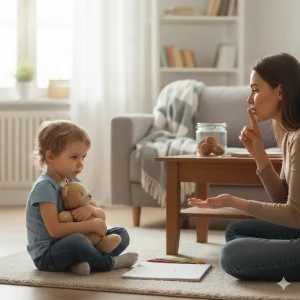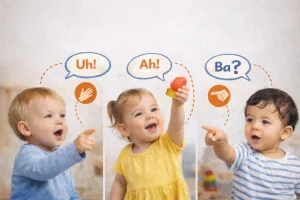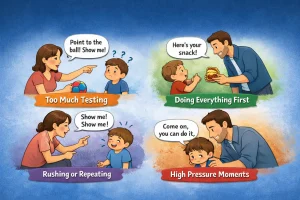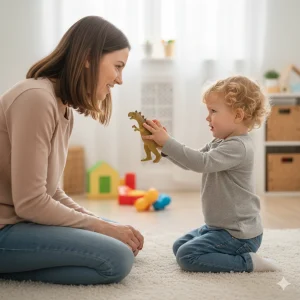When to See a Speech Therapist: Guide for Parents of Toddlers
Last Updated: August 19, 2025
Is your toddler still not talking much? You’re not alone—and you’re not wrong to wonder if it’s time to get help. Between 18 to 24 months, toddlers usually start saying more words and putting them together. But some children may be slower to speak, and that’s when many parents ask, “When should I see a speech therapist?”
In this guide, we’ll walk you through common speech milestones, red flags to watch for, and what to expect if you decide to get support. Don’t worry—help is available, and early steps make a big difference
Free Speech Help for Kids
Concerned about speech delays? Book a free consultation with our expert speech therapist and get guidance tailored to your child’s needs.
What is a Speech Therapist and What Do They Do for Toddlers?
If you’re a parent wondering why your toddler isn’t talking much yet—or maybe not at all—you’re not alone. It’s common to feel confused about when to seek help. This is where a speech-language pathologist (SLP) comes in.
What is a Speech-Language Pathologist (SLP)?
A speech-language pathologist, or speech therapist, is a trained expert who helps children with challenges in speaking, understanding words, or using language to express themselves. For toddlers, they don’t just look at how many words your child says—they also look at how your child listens, understands, and communicates in everyday situations.
They’re not just for “speech problems.” Many toddlers struggle with things like:
- Not responding to their name
- Using very few words by 18–24 months
- Getting frustrated when trying to talk
- Saying sounds that are hard to understand
An SLP helps figure out what’s going on and how to guide your child forward gently and playfully.
The Role of a Speech Therapist for Toddlers
Think of a toddler speech therapist as your child’s communication coach. Their job is to help your child:
- Learn new words and how to use them
- Improve how clearly they speak
- Follow simple directions
- Interact and respond during play or routine tasks
Speech therapists don’t just work with children—they also work closely with parents. They show you fun, everyday ways to help your child talk more during meals, bath time, or play.
How Speech Therapy Helps With Speech and Language Delays
Early speech therapy isn’t about pressure—it’s about support. Toddlers learn best through play, songs, and interaction. A speech therapist creates personalized plans that match your child’s unique needs and pace.
With the right support, your child can:
- Say more words
- Use two-word combinations
- Understand what others say
- Feel more confident when communicating
Speech Milestones for 18–24 Month Olds: What’s Typical?
Every child learns to talk at their own pace—but there are general speech and language milestones you can look out for. These milestones help you know if your toddler is on track or might need a little extra support.
How Many Words Should an 18-Month-Old Say?
By around 18 months, most toddlers say about 10 to 20 words. These might include familiar names like “mama,” “dada,” favorite foods like “banana,” or fun words like “uh-oh.” Some kids may say fewer, and some more—but what matters is that you see steady growth.
By 24 months, toddlers typically say at least 50 words and begin putting two words together, like “more juice” or “go car.” If your child isn’t using many words by this age, it’s a good idea to gently check in with a speech therapist to see if they need help.
Expected Communication Skills in Toddlers
Speech isn’t just about talking—it’s also about how your child listens and responds. Here are a few key things many toddlers do by 18–24 months:
- Follow simple instructions like “Come here” or “Give me the ball”
- Point to objects when named (like “Where’s the dog?”)
- Use gestures like waving, pointing, or nodding
- Show interest in other people or try to copy what you say
- Enjoy songs, rhymes, and looking at books
If your toddler is quiet most of the time or doesn’t seem to understand what you say, it might be time to look a bit deeper.
Receptive vs Expressive Language Development
It helps to know that speech development has two sides:
- Receptive language is how your child understands what others say
- Expressive language is how your child uses words or sounds to communicate
Some toddlers understand everything but don’t say much yet. That’s a good sign! It shows their receptive language is developing. But if both understanding and talking seem delayed, it could be time to speak to a specialist.
Common Causes of Speech Delay in Toddlers
If your toddler isn’t talking as much as expected, it’s natural to wonder why. Speech and language development is influenced by many factors—and not all delays are a sign of something serious. Let’s look at some of the most common causes of communication delay in toddlers.
1. Hearing Problems
Even mild hearing issues can affect how your child learns to talk. If your toddler has frequent ear infections or seems to ignore sounds, it could be that they’re simply not hearing clearly. When a child can’t hear sounds properly, they may not learn how to say them correctly either.
Tip: If you suspect a hearing issue, it’s best to start with a simple hearing check. Many speech delays improve once hearing problems are treated.
2. Bilingual Home Environment
If you speak more than one language at home, that’s a wonderful gift for your child. But sometimes, it may take a little longer for toddlers to start speaking clearly in one language. This isn’t a problem—it’s a natural part of bilingual development.
The key is to continue talking, reading, and playing in both languages. If your child isn’t using many words in either language by 2 years, it’s still okay to reach out for advice.
3. Family History of Delay
Speech and language delays can sometimes run in families. If you or other close relatives were “late talkers,” your child might be on a similar path. While some kids do catch up on their own, others may benefit from early support to make learning smoother.
If you’re noticing delays and know there’s a family pattern, don’t wait too long—early help makes a big difference.
4. Screen Time and Limited Interaction
Screens are everywhere—but too much screen time and not enough real-life interaction can slow down speech development. Toddlers learn to talk by hearing words during face-to-face conversations, play, and shared activities. If your child spends a lot of time with a device instead of people, they may miss out on the back-and-forth talking that builds language.
Try to keep screen time short and focus on play, stories, and real conversations to help your child’s language grow.
When Should You Worry and Call a Speech Therapist?
As a parent, it’s easy to wonder: “Is my child just a late bloomer, or is something more going on?” It’s a common question—and an important one. Knowing when to see a speech therapist can help your toddler get the support they need at the right time.
How to Know When It’s Not “Just a Phase”
Some toddlers talk later than others, and that’s okay. But if certain signs keep showing up—or not showing up—it may be more than just a delay. For example, if your child isn’t using any words by 18 months or still not combining words by age 2, it’s a good idea to check in.
Trust your gut. If something feels off, even if others say “don’t worry,” it’s okay to ask for help. The earlier you know what’s going on, the better you can support your child.
Quick Checklist: When to See a Speech Therapist
Here’s a simple checklist to help guide your decision:
- Not saying any words by 18 months
- Using fewer than 50 words by age 2
- Not combining two words (like “want milk”) by 24 months
- Rarely responds to name or simple instructions
- Gets frustrated but can’t express needs
- Family members often say “I don’t understand what they’re saying”
If you’re checking off more than one of these, it’s a good time to speak with a speech therapist.
Why Early Support Matters
You don’t have to wait until your child falls far behind to get help. In fact, early support often prevents bigger challenges later. A speech therapist can guide you with small, simple activities that boost your child’s talking and understanding in ways that feel fun—not stressful.
At Wellness Hub, we believe in gentle, goal-based speech therapy designed around your toddler’s needs. Whether you need a quick screening or want to start therapy sessions, our expert team is here to help you take the next step confidently.
What Happens in Toddler Speech Therapy?
If you’re thinking about speech therapy for your toddler, you might be wondering—what actually happens during these sessions? The good news is, it’s not scary or stressful. In fact, most kids think it’s playtime (and that’s the point!). Here’s what you can expect from the speech therapy process.
First Speech Evaluation: Getting to Know Your Child
The journey begins with a speech and language evaluation. This first session helps the therapist understand how your toddler communicates right now. It might include:
- Watching how your child plays and interacts
- Asking you questions about what your child says and understands at home
- Checking how your toddler listens, speaks, gestures, or responds
It’s relaxed and child-friendly. There’s no pressure to “perform”—it’s more about observing and understanding your child’s communication style.
Play-Based Sessions That Feel Like Fun
Speech therapy for toddlers isn’t like school. Instead of drills or flashcards, it’s all about learning through play. A typical session might include:
- Playing with toys that encourage talking (like cars, animals, puzzles)
- Singing songs and using rhymes to build word memory
- Looking at books and naming pictures together
- Practicing simple words, sounds, or gestures during fun routines
The therapist gently guides your child to use more words, respond to sounds, and interact with others—all in a natural, engaging way.
Parents Are a Big Part of the Process
One of the most important parts of toddler speech therapy is parent involvement. You’ll often be in the room during sessions or get ideas to try at home. This might include:
- Simple ways to talk more during everyday routines
- How to repeat and expand your child’s words
- Games and songs to build vocabulary
- Gentle tips to reduce frustration and encourage speech
With this support, you become your child’s best communication coach—even between sessions.
How Wellness Hub Supports Early Speech Development
If you’re feeling unsure about your toddler’s speech, you don’t have to figure it out alone. At Wellness Hub, we make early speech support simple, accessible, and family-friendly—because we know every word matters.
Online and Offline Therapy Options
Whether you prefer face-to-face sessions or the comfort of your home, we’ve got you covered. Our team offers both offline sessions in select locations and online speech therapy that fits right into your daily routine. All you need is a mobile, tablet, or laptop—and a few minutes of quiet playtime.
Our virtual platform is designed to keep toddlers engaged while giving parents the tools to continue the progress outside sessions.
Expert Speech Therapists for Toddlers
Our therapists are not only trained professionals—they’re also patient, playful, and understand the ups and downs of toddler behavior. We focus on creating a safe, encouraging space where children can explore, express, and grow their language step by step.
Whether your child is just starting to talk or needs more structured help, we tailor our support to match their unique pace.
Early Screening and Custom Programs
Not sure where to begin? Start with our early screening services, which help you understand whether your toddler’s communication is on track. If support is needed, we create custom programs with clear goals and fun activities that blend into your child’s daily life.
Each plan is built around real progress—not pressure.
Tips to Boost Speech at Home Before Therapy Starts
If you’re waiting for a speech therapy appointment—or just wondering how to support your child now—there’s a lot you can do at home. Knowing how to help your toddler talk more doesn’t mean doing anything fancy. Small, simple steps can make a big impact.
Here are some easy ways to build your toddler’s communication skills through everyday life:
Talk During Daily Routines
Your child learns language by hearing it often. Use every opportunity—mealtime, bath time, changing clothes—to describe what’s happening.
Example:
“This is your shirt. Let’s put your arm in. One arm, two arms!”
These short conversations teach your child words without pressure.
Read Books with Repetition
Choose simple picture books with repeating phrases like “Brown Bear, Brown Bear” or “Dear Zoo.” Repetition helps toddlers remember and copy words over time.
Encourage your child to point at pictures or finish the last word of a sentence. This kind of reading is fun and builds strong language habits.
Limit Screen Time
Screens may be entertaining, but they don’t replace real conversation. The more your child watches, the fewer chances they get to listen, respond, and learn.
Try to replace screen time with shared play, singing, or storytelling. Even 10 minutes of face-to-face talk is more powerful than passive listening.
Use Short and Clear Phrases
Toddlers need time to understand language. Speak in short, simple phrases and pause after you talk to give them a chance to respond.
Instead of: “Can you give me the blue car from the box?”
Try: “Give car. Blue car.”
Clear, slow speech helps your toddler learn how words are used and when.
Imitate and Expand Your Child’s Sounds
When your child babbles or says a word, copy them and add just a little more.
- Child says: “Dog!”
- You say: “Yes! Big dog!”
- Child says: “More!”
- You say: “More juice!”
This shows your child how to build on what they already know—and encourages more talking without pressure.
Conclusion
Every child is different, but early support really makes a difference. If your toddler isn’t talking much yet, don’t wait and wonder. Even small steps now can lead to big progress later. Early help can boost your child’s speech, reduce frustration, and make learning fun again. At Wellness Hub, we offer expert speech therapy for toddlers—online and offline—with easy tools for parents. You don’t have to do it alone.
Frequently Asked Questions:
1. When should I take my toddler to a speech therapist?
If your toddler is not saying words by 18 months or not using two-word phrases by age 2, it’s a good time to see a speech therapist. Early support can help your child catch up faster.
2. How many words should an 18-month-old say?
Most 18-month-olds say about 10 to 20 words. If your child says very few words or none at all, it may be a sign of a speech delay.
3. Is it normal for a 2-year-old not to talk?
Some children talk later than others, but by age 2, most toddlers use at least 50 words and combine two words. If your 2-year-old isn’t doing this, it’s best to check with a speech therapist.
4. What are the signs of speech delay in toddlers?
Common signs include: not saying any words by 18 months, not combining words by age 2, not following simple instructions, or being hard to understand even by close family.
5. What causes speech delay in toddlers?
Speech delay can be caused by hearing issues, limited social interaction, too much screen time, a bilingual home, or family history. Each child is different, so it’s good to get a professional opinion.
6. How can I help my toddler talk more at home?
You can help by talking during daily routines, reading simple books, singing songs, using short phrases, and repeating your child’s words. These small steps build language every day.
7. What happens in toddler speech therapy?
Speech therapy is play-based and fun. Therapists use toys, songs, and games to teach speech and language. Parents also get tips to help at home.
8. Will my child need long-term therapy?
Not always. Many toddlers make great progress with short-term support. The earlier you start, the quicker the improvement.
9. Can a speech delay fix itself without therapy?
Some children do catch up on their own, but many need a little help. A speech therapist can guide you on whether therapy is needed or not.
10. Where can I find good speech therapy for toddlers?
You can visit WellnessHub for online and offline speech therapy programs. Our expert therapists work closely with parents to support early speech development in toddlers.
About the Author:
Shravanaveena Gajula
M.Sc ., Speech and Language Pathology (5+ years of experience)
Shravanaveena Gajula is a dedicated Speech-Language Pathologist with a BASLP and an M.Sc in Speech and Language Pathology. With experience spanning multiple settings, including Wellness Hub , Veena specializes in a wide range of disorders from developmental issues in children to speech and language assessments in adults. Her expertise includes parent counseling, managing speech sound and fluency disorders, and creating individualized therapy programs. Veena is also PROMPT certified and an author of several insightful blogs on speech and language pathology, aiming to educate and assist caregivers in supporting their loved ones.
Book your Free Consultation Today
Parent/Caregiver Info:
Client’s Details:
* Error Message
